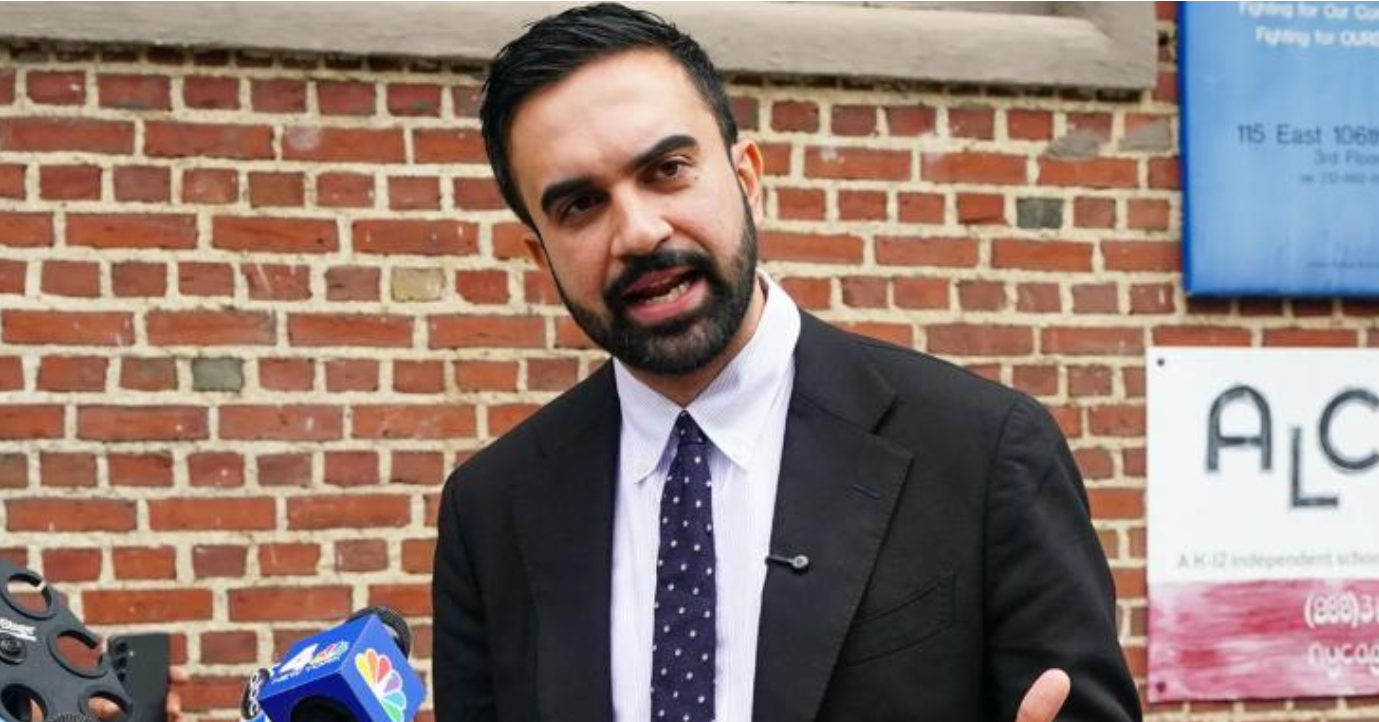Earlier today, it was certified that Zohran Madami, a democratic socialist, won the Democratic Primary to be Mayor of New York. FAIR's Ari Paul examined how Madami overcame the corporate media.
Media Did Their Best to Scare Voters Away From Zohran Mamdani
By Ari Paul
They tried. Oh, did the media try.
The declared victory for Zohran Mamdani, a democratic socialist, in the Democratic primary for New York City mayor highlights many things. The power of his campaign, the popularity of his ideas, the importance of grassroots get-out-the-vote mobilization, and the tepid reception for Andrew Cuomo, who resigned as the state’s governor due to a myriad of sexual harassment allegations, all contributed to the surprising—to corporate media, anyway—result.
Earlier this month, FAIR’s Raina Lipsitz (6/13/25) responded to a New York profile (5/20/25) that attempted to undermine Mamdani’s record. In the home stretch of the primary race in the latter half of June, the pressure against Mamdani increased, featuring thoughtless dismissals of his ideas, selective memory and factual inaccuracy in the service of lowering Mamdani’s electoral chances.
That Mamdani emerged from this mess victorious exposes the out-of-touchness of establishment media outlets that twisted like pretzels to scare voters away from the 33-year-old phenomenon. (Readers should know that I ranked Mamdani first in the primary and contributed to his campaign. I’m not unbiased when it comes to who I want to see as mayor, but the analysis of the media that follows, I believe, will withstand scrutiny.)
‘Uniquely unsuited to the city’s challenges’
The New York Times editorial board (6/16/25) argued that “Mr. Mamdani is running on an agenda uniquely unsuited to the city’s challenges.” They explained:
He is a democratic socialist who too often ignores the unavoidable trade-offs of governance. He favors rent freezes that could restrict housing supply and make it harder for younger New Yorkers and new arrivals to afford housing. He wants the government to operate grocery stores, as if customer service and retail sales were strengths of the public sector. He minimizes the importance of policing.
At least one poll shows that a rent freeze is overwhelmingly popular (City and State, 4/15/25), and they’re far from unheard of: Rent freezes were a key policy victory under Mayor Bill de Blasio (City Limits, 6/28/16; Politico, 3/15/17; WNBC, 6/17/20), a mayor whose candidacy the board (9/5/17, 11/2/17) had enthusiastically supported.
The landlord class, which has organized against Mamdani’s campaign (Jacobin, 6/23/25), no doubt agrees with the Times‘ argument that if we don’t let rents go up, housing will be unaffordable—though 12 years of steady increases on regulated rentals under the tenure of Mayor Michael Bloomberg didn’t seem to make it easier to get an apartment here.
And is the grocery store pitch such a crazy idea? The rising cost of food, despite the Times’ framing, is a very real problem for New Yorkers (Daily News, 5/1/25). The city operates public housing, homeless shelters and hospitals—and a public education system that delivers daily meals to more than 900,000 students.
The Times (12/12/24) positively explored the idea of city-owned stores in its news pages, citing how cities like Chicago and Atlanta were exploring similar missions. But when Mamdani proposes it, the editors present it as a sign of kookiness.
‘The disorder of the past decade’
The paper continued:
Most worrisome, he shows little concern about the disorder of the past decade, even though its costs have fallen hardest on the city’s working-class and poor residents. Mr. Mamdani, who has called Mr. de Blasio the best New York mayor of his lifetime, offers an agenda that remains alluring among elite progressives but has proved damaging to city life.
What disorder is the board talking about? We can guess they mean crime, but the homicide rate in New York City for the past ten years is the lowest it’s been since the 1950s. It’s true that Mamdani believes in police reform. The Times editorial board used to champion this cause (7/13/20, 9/13/20), even endorsing a reform-minded democratic socialist defense attorney for Queens district attorney five years ago (6/18/19).
Alex Vitale, professor of sociology at Brooklyn College and coordinator of the Policing and Social Justice Project, suggested that—”given that crime rates are at or near historic low”—the Times‘ “disorder” is likely “the presence of homeless mentally ill people on the subway and other public spaces.” But, he argues:
Ironically, Mamdani and to some extent [Comptroller Brad] Lander are the candidates who have actual plans to address the kind of disorder that pearl-clutching Times readers are worried about. They understand that the solution to this decades old problem is not endlessly using police to cycle people through jails and hospitals, but instead to develop actual supportive housing and other essential social services.
The Times has capitulated to neoliberal austerity, which accepts that cities have no choice but to cut services and turn the real estate market over to billionaires, and then use policing to manage the chaos that ensues.
As for the idea that Mamdani is somehow just a candidate for “elite progressives” but not the “working-class and poor,” the Times’ own interactive map shows a more nuanced story. While it’s true that Cuomo did well in, for example, the impoverished South Bronx, in Manhattan he won the monied districts like Tribeca and the Upper East and West Side, while Mamdani carried lower-income neighborhoods like Harlem, Washington Heights and the Lower East Side. Mamdani’s funding came mostly from small contributions—he had seven times as many donors as Cuomo (New York Times, 5/6/25)—whereas Cuomo was heavily funded by billionaires and the real-estate industry (City, 6/26/25).
‘A quality of magical realism’
What disorder is the board talking about? We can guess they mean crime, but the homicide rate in New York City for the past ten years is the lowest it’s been since the 1950s. It’s true that Mamdani believes in police reform. The Times editorial board used to champion this cause (7/13/20, 9/13/20), even endorsing a reform-minded democratic socialist defense attorney for Queens district attorney five years ago (6/18/19).
Alex Vitale, professor of sociology at Brooklyn College and coordinator of the Policing and Social Justice Project, suggested that—”given that crime rates are at or near historic low”—the Times‘ “disorder” is likely “the presence of homeless mentally ill people on the subway and other public spaces.” But, he argues:
Ironically, Mamdani and to some extent [Comptroller Brad] Lander are the candidates who have actual plans to address the kind of disorder that pearl-clutching Times readers are worried about. They understand that the solution to this decades old problem is not endlessly using police to cycle people through jails and hospitals, but instead to develop actual supportive housing and other essential social services.
The Times has capitulated to neoliberal austerity, which accepts that cities have no choice but to cut services and turn the real estate market over to billionaires, and then use policing to manage the chaos that ensues.
As for the idea that Mamdani is somehow just a candidate for “elite progressives” but not the “working-class and poor,” the Times’ own interactive map shows a more nuanced story. While it’s true that Cuomo did well in, for example, the impoverished South Bronx, in Manhattan he won the monied districts like Tribeca and the Upper East and West Side, while Mamdani carried lower-income neighborhoods like Harlem, Washington Heights and the Lower East Side. Mamdani’s funding came mostly from small contributions—he had seven times as many donors as Cuomo (New York Times, 5/6/25)—whereas Cuomo was heavily funded by billionaires and the real-estate industry (City, 6/26/25).
‘A quality of magical realism’
What disorder is the board talking about? We can guess they mean crime, but the homicide rate in New York City for the past ten years is the lowest it’s been since the 1950s. It’s true that Mamdani believes in police reform. The Times editorial board used to champion this cause (7/13/20, 9/13/20), even endorsing a reform-minded democratic socialist defense attorney for Queens district attorney five years ago (6/18/19).
Alex Vitale, professor of sociology at Brooklyn College and coordinator of the Policing and Social Justice Project, suggested that—”given that crime rates are at or near historic low”—the Times‘ “disorder” is likely “the presence of homeless mentally ill people on the subway and other public spaces.” But, he argues:
Ironically, Mamdani and to some extent [Comptroller Brad] Lander are the candidates who have actual plans to address the kind of disorder that pearl-clutching Times readers are worried about. They understand that the solution to this decades old problem is not endlessly using police to cycle people through jails and hospitals, but instead to develop actual supportive housing and other essential social services.
The Times has capitulated to neoliberal austerity, which accepts that cities have no choice but to cut services and turn the real estate market over to billionaires, and then use policing to manage the chaos that ensues.
As for the idea that Mamdani is somehow just a candidate for “elite progressives” but not the “working-class and poor,” the Times’ own interactive map shows a more nuanced story. While it’s true that Cuomo did well in, for example, the impoverished South Bronx, in Manhattan he won the monied districts like Tribeca and the Upper East and West Side, while Mamdani carried lower-income neighborhoods like Harlem, Washington Heights and the Lower East Side. Mamdani’s funding came mostly from small contributions—he had seven times as many donors as Cuomo (New York Times, 5/6/25)—whereas Cuomo was heavily funded by billionaires and the real-estate industry (City, 6/26/25).
‘A quality of magical realism’
It is not surprising that Rupert Murdoch’s editorial boards savaged Mamdani. The New York Post (6/23/25) called him a “cheap influencer” and “a babyfaced socialist antisemite who’s never accomplished anything except this so-buzzy campaign.” Likewise, Murdoch’s pro-business Wall Street Journal (6/22/25) claimed that “Manhattanites are warning that Mr. Mamdani’s ruinous utopianism could prompt a flight of talent and capital.”
But the onslaught from the more centrist outlets is telling: Like the business establishment, they fear progressive economic policies when it comes to housing, education, transit and public safety, despite all overtures to the contrary.
The good news is that this press assault failed. Perhaps that is because the political advice of the New York Times and Atlantic only still sways opinion in a few enclaves of the upper crust. The rage from the Post, Daily News and Journal probably only reached conservative audiences, who wouldn’t have ranked Mamdani anyway. And perhaps it also is testament to the degree that a grassroots messaging campaign can overcome an onslaught from the corporate media.
The bad news is that this was only the primary: incumbent Mayor Eric Adams will be running in the general election as an independent, and Andrew Cuomo has left that option open. Monied interests will likely double down, hoping to spread enough fear of a Mamdani-run New York City to help sink his meteoric rise—and elite media are rarely far behind them.


